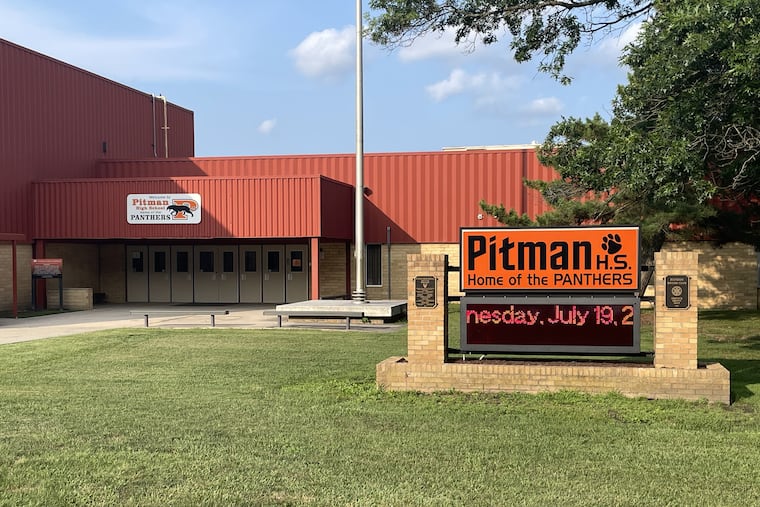‘We were not expecting it.’ South Jersey school districts are bracing for possible budget cuts without more state aid.
About 100 districts were notified they would receive less aid. With the March 20 deadline quickly approaching to submit preliminary budgets, many are scrambling to fill the gaps.

Bigger classes. Cuts to programs and extracurriculars. Teacher layoffs. Higher property taxes.
Faced with a decrease in state aid for the 2024-25 school year, some New Jersey school systems are bracing for possible budget cuts that could upend education in those districts.
South Jersey districts including Cherry Hill, Collingswood, Haddon Township, Lenape Regional and Pitman are among those appealing to the Legislature, hoping to have millions in funding restored for the upcoming year. They also want the state to change the formula used to calculate aid, which relies heavily upon property taxes.
In his proposed budget, Gov. Phil Murphy included historic funding for most of New Jersey’s 600 school districts, which enroll about 1.1 million students. For the first time in state history, the requirements of the funding formula used to determine how much aid districts receive would be fully met.
» READ MORE: Phil Murphy wants a $55.9B New Jersey budget with increases for education and a business tax to fund transit
However, about 100 districts were notified a few weeks ago that they would receive less aid. With the March 20 deadline quickly approaching to submit preliminary budgets for next year, many are scrambling to fill the gaps.
Lenape Regional High School district in Burlington County was expecting its state aid would be reduced by no more than $350,000, said Kara Huber, its business administrator.
“Unfortunately we were hit with a cut of $4.69 million,” Huber said. “We were not expecting it.” The district, which operates five high schools, said it would be forced to make deeper cuts.
‘I understand what challenges you’ve had’
School officials and advocates have been attending state House hearings and launching public campaigns in their towns urging residents to appeal to lawmakers. They’re also notifying residents and sounding the alarm at school board meetings. Districts have until April 30 to finalize their budgets.
State Senate Education Committee Chairman Vin Gopal, (D., Monmouth), convened a hearing Thursday to get feedback specifically about the school funding formula, which lawmakers want to eventually revise. Speakers took the opportunity to address this year’s aid figures.
“I understand what challenges you’ve had,” Gopal said. “I really want to focus on the future.”
Gopal said more than 60 districts had asked to speak during the three-hour hearing, but only nine were invited, along with eight representatives from associations. Some districts are planning to attend a budget hearing in the Assembly Chamber on Wednesday and encouraged residents to pack the chambers.
Lawmakers expressed support for changing the funding formula. Whether the state will bail out districts facing shortfalls was unclear. The state divvied up $167 million last year to help districts avoid cuts.
“Hopefully, we can address the needs for a fairer funding formula,” said State Sen. Shirley Turner, (D., Mercer). “It’s long overdue.”
Acting Cherry Hill Superintendent Kwame Morton said his district is bracing for a $6.9 million cut in aid, the second-largest cut in the state. The district, the 11th largest in New Jersey, had received several years of increased aid and was stunned by the drop, he said.
“Facing the financial challenges brought on by the deficit, we find ourselves in a difficult position,” Morton testified. Even if the district asked voters to approve a 2% property tax increase, the maximum allowed under a state cap, the district would have a $2 million budget shortfall, he said.
Asked by a senator whether “everything is on the table this year,” Morton replied yes.
» READ MORE: Cherry Hill voters approved a $363 million school bond referendum, N.J.’s largest in at least a decade
During a budget presentation at a Cherry Hill school board meeting last week, business administrator Lynn Shugars outlined several scenarios that could be implemented to narrow the gap between revenue and spending. The priority would be to target non-personnel areas first — technology, buildings and grounds, and extracurricular activities, she said.
In a worst-case scenario, Shugars said the district may need to consider a tax increase and cut up to 60 positions. Staff cuts would impact class sizes and programs offered, she said.
Pitman school board president April Miller told the Senate committee that she believes her Gloucester County district was shortchanged because the state miscalculated the district’s wealth, which is factored into the funding formula. She said the state should also consider lifting the property tax cap to allow communities to consider raising taxes.
Oaklyn school board member Jimmy McMillan said in another hearing last week that his Camden County school system “could be forced to fully dismantle” because of a cut in state aid. The district stands to lose $670,000, or 20%, of its budget, he said.
“Time is of the essence to see if we can fix this issue before budgets are due, if that’s at all possible,” McMillan said.